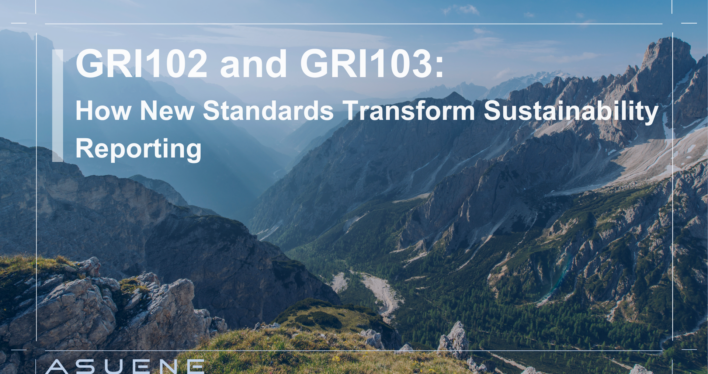- Article Summary
-
Overview
The Global Reporting Initiative (GRI) recently introduced two updated standards, GRI 102: Climate Change and GRI 103: Energy, to significantly improve corporate transparency and drive meaningful sustainability action. These standards, effective from January 2027, deepen disclosures around greenhouse gas (GHG) emissions, energy use, climate transition plans, and social impacts, aligning closely with leading global frameworks such as the GHG Protocol, TCFD, IFRS S2 (ISSB), ESRS, and SBTi. This article explores these groundbreaking standards, their implications for sustainability reporting, corporate strategy, and global stakeholder engagement.
What is the Global Reporting Initiative (GRI)?
The Global Reporting Initiative (GRI) is an independent, international organization that helps businesses, governments, and other organizations understand and communicate their impacts on critical sustainability issues such as climate change, human rights, and governance. Founded in 1997, GRI provides the world’s most widely used standards for sustainability reporting. These standards enable organizations to transparently report their sustainability performance, enhancing accountability and informing stakeholder decisions.
Key Changes Introduced by the GRI Climate Change and Energy Standards
The updated GRI standards require detailed and comprehensive disclosures, notably:
- Climate Change (GRI 102): Scope 1, 2, and 3 emissions; climate transition and adaptation plans; impacts on social groups (workers, communities, Indigenous Peoples); carbon credits and removals; and just transition metrics.
- Energy (GRI 103): Detailed reporting on renewable and non-renewable energy consumption, energy intensity, efficiency measures, upstream and downstream energy use, and associated policies.
These changes emphasize quantitative data, scenario analyses, and the human dimension of climate action, significantly enhancing stakeholders’ understanding of corporate climate strategies and impacts.
Why Enhanced Climate Reporting Matters for Businesses
Enhanced climate disclosures under the new GRI standards empower companies by strengthening stakeholder confidence through transparent, science-based climate strategies. They help businesses identify operational efficiencies and cost-saving opportunities by closely tracking detailed energy-use data. Furthermore, aligning reporting practices with international regulatory expectations and stakeholder frameworks enables companies to streamline reporting processes, minimizing duplication and maximizing relevance. Ultimately, companies effectively positioned with these standards will benefit from increased reputational value, reduced risk exposure, and stronger competitive advantages in an increasingly climate-conscious market.
Implementing the Standards: Practical Steps for Corporates
Businesses can smoothly transition to the new reporting standards by:
- Conducting comprehensive GHG inventories covering Scope 1–3 emissions.
- Developing clear, science-based climate transition and adaptation plans, including consideration of just transition measures.
- Expanding energy reporting to detail both renewable and non-renewable consumption, energy intensity, and lifecycle energy usage.
- Evaluating and addressing social impacts on workers, local communities, and Indigenous Peoples.
- Enhancing internal data systems and cross-functional coordination for accurate reporting.
- Leveraging GRI’s training resources, FAQs, and early adopter insights for successful implementation.
- Utilizing GRI’s new digital resource designed to expedite data collection and streamline the reporting process.
Metrics collected under these standards can also be utilized for other global reporting frameworks, further enhancing efficiency and reducing duplication in sustainability reporting.
Conclusion: Towards a More Transparent and Sustainable Future
The revised GRI Climate Change and Energy Standards represent a pivotal advancement in global sustainability reporting, combining environmental transparency with social responsibility. By adopting these comprehensive standards, companies significantly bolster their sustainability strategies, meeting international expectations while driving genuine climate progress. This proactive approach ensures greater accountability and positions businesses firmly on the path towards a sustainable and resilient global economy.
Why Work with ASUENE Inc.?
Asuene is a key player in carbon accounting, offering a comprehensive platform that measures, reduces, and reports emissions, including Scope 1-3. Asuene serves over 10,000 clients worldwide, providing an all-in-one solution that integrates GHG accounting, ESG supply chain management, a Carbon Credit exchange platform, and third-party verification.
ASUENE supports companies in achieving net-zero goals through advanced technology, consulting services, and an extensive network.


